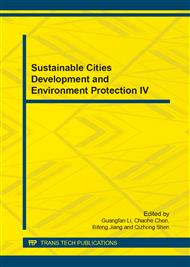p.136
p.140
p.145
p.149
p.155
p.161
p.166
p.171
p.176
Research of Shaanxi Province Urbanization Development Quality Evaluation Based on the Entropy Value Method
Abstract:
The weakness of the existing system of urbanization comprehensive evaluation is: evaluation Indexes were not comprehensive, and the evaluation system can’t reflect the real situation; analysis method was complex, and difficult to operate. We established evaluation index system from the economic development, social development, living, environment, infrastructure, spatial density, and urban-rural gap. We used entropy and comprehensive evaluation method to process and analyze the indicators. The results show that the quality of urbanization development is obviously different in Shaanxi Province, the effect of secondary cities is not obvious to promote the development, and the internal gap is still large in provincial cities and sub-index level.
Info:
Periodical:
Pages:
155-160
Citation:
Online since:
July 2014
Authors:
Keywords:
Price:
Сopyright:
© 2014 Trans Tech Publications Ltd. All Rights Reserved
Share:
Citation:


